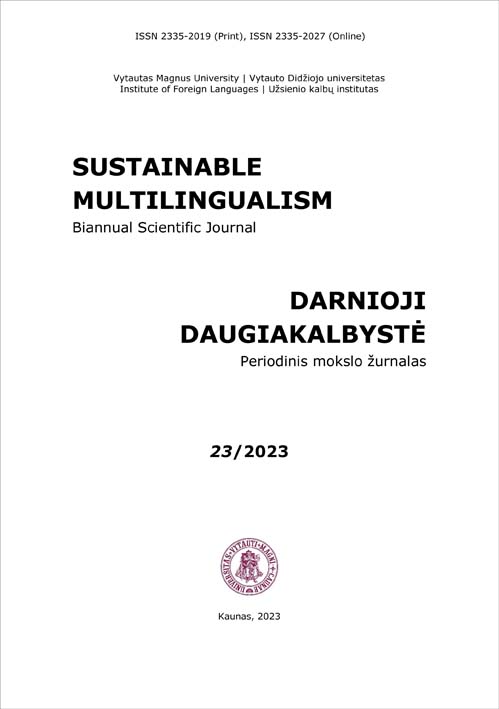Translanguaging in Teaching and Learning of English at University Level: The Perspectives of Ukrainian Students and Their Teachers
Translanguaging in Teaching and Learning of English at University Level: The Perspectives of Ukrainian Students and Their Teachers
Author(s): Jurgita Cvilikaitė-Mačiulskienė, Aurelija Daukšaitė-Kolpakovienė, Gabrielė Gvazdikaitė, Eglė LinkevičiūtėSubject(s): Language studies, Language and Literature Studies, Foreign languages learning
Published by: Vytauto Didžiojo Universitetas
Keywords: Code-switching; Teaching English as a foreign language; Teachers of English; Translanguaging; Translation; Ukrainian students;
Summary/Abstract: Classrooms at all levels of education are becoming more diverse, as they include more and more multilingual and multicultural students. Their teachers start understanding that, especially in foreign language classes, monolingual approaches to teaching and learning are not effective anymore, and search for other pedagogical techniques and practices that would involve their students’ linguistic repertoires as an asset in their classes. This study aimed to learn about the attitudes towards and experiences of the use of other languages in the English classroom by including the perspectives of English teachers and their Ukrainian students who, having fled their home country due to the war against Ukraine or having chosen to participate in student exchange, came to study at Vytautas Magnus University in Kaunas, Lithuania. Two online questionnaires including open and closed ended questions were used to gather data. Thus, the study was both quantitative and qualitative. Even though several literature review sections in this article describe a switch from monolingual to a more holistic paradigm that includes translanguaging, this and other terms employed to describe the use of other languages were not introduced to the research participants. The English teachers’ and their Ukrainian students’ attitudes towards and experiences of the use of other languages in the English classroom are first looked at separately and then compared in the concluding section. The findings revealed that both Ukrainian students (58.3%) and teachers (84.2%) have experience of other languages being used in their English classroom. They also agree that translation into the language that students understand is used as a strategy helping the students to understand grammar and vocabulary, yet the students indicated gesturing as a strategy used to explain unknown vocabulary. Other strategies related to the use of other languages were also mentioned and described. The teachers and the students pointed out that Russian and Lithuanian were the most frequently employed other (than English) languages in their English classroom, even though the teachers believed they used mostly Russian, whereas the students believed their teachers mostly used Lithuanian.
Journal: Darnioji daugiakalbystė
- Issue Year: 2023
- Issue No: 23
- Page Range: 25-62
- Page Count: 38
- Language: English

